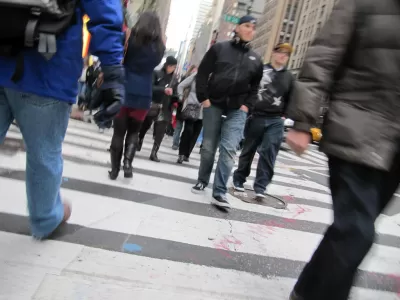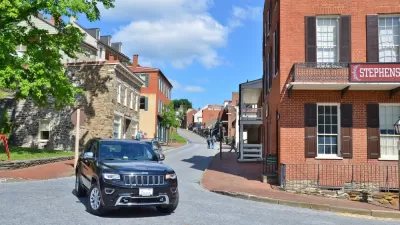Jarrett Walker offers insights into "Right of Way," a book written last year by Angie Schmitt that is influencing the traffic safety conversation and pushing the fields of planning and engineering in new directions.

Jarrett Walker discusses Angie Schmitt's book Right of Way: Race, Class, and the Silent Epidemic of Pedestrian Deaths in America–one of Planetizen's Top Urban Planning Books of 2020–which argues that our singular focus on "the standard suburban street, mass produced around every US city according to manuals that prioritized traffic flow over all other aspects of human life," has led to a "silent epidemic" of pedestrian deaths.
Today, "50% more pedestrians are dying after being struck by vehicles" than ten years ago. In her book, Schmitt points to causes such as "the dominant culture’s impulse to blame the pedestrian, which started with the invention of the crime of 'jaywalking' almost a century ago," and the "pervasive language choices made by journalists, law enforcement, and other officials that tend to exonerate the motorist no matter what the facts are." Other contributing factors include "the trend toward larger and higher-riding cars that make it harder to see a child stepping into the street" and the overly enthusiastic claims of autonomous car manufacturers.
Of course, road design still lies at the heart of the problem. In Schmitt's book, "[a] chapter called The Ideology of Flow looks at how and why streets have been designed on the principle that traffic speed simply matters more than the safety of pedestrians." Here, says Walker, "she must take on the Manual of Uniform Traffic Control Devices (MUTCD) an excellent example of the principle that the most controversial ideologies are often hidden in documents whose titles promise that they are utterly boring and irrelevant." Her book "invites the reader to think about the value of human life when it conflicts with our need or longing to go places quickly."
FULL STORY: Pedestrian Deaths are an Epidemic

Maui's Vacation Rental Debate Turns Ugly
Verbal attacks, misinformation campaigns and fistfights plague a high-stakes debate to convert thousands of vacation rentals into long-term housing.

Planetizen Federal Action Tracker
A weekly monitor of how Trump’s orders and actions are impacting planners and planning in America.

Chicago’s Ghost Rails
Just beneath the surface of the modern city lie the remnants of its expansive early 20th-century streetcar system.

Bend, Oregon Zoning Reforms Prioritize Small-Scale Housing
The city altered its zoning code to allow multi-family housing and eliminated parking mandates citywide.

Amtrak Cutting Jobs, Funding to High-Speed Rail
The agency plans to cut 10 percent of its workforce and has confirmed it will not fund new high-speed rail projects.

LA Denies Basic Services to Unhoused Residents
The city has repeatedly failed to respond to requests for trash pickup at encampment sites, and eliminated a program that provided mobile showers and toilets.
Urban Design for Planners 1: Software Tools
This six-course series explores essential urban design concepts using open source software and equips planners with the tools they need to participate fully in the urban design process.
Planning for Universal Design
Learn the tools for implementing Universal Design in planning regulations.
planning NEXT
Appalachian Highlands Housing Partners
Mpact (founded as Rail~Volution)
City of Camden Redevelopment Agency
City of Astoria
City of Portland
City of Laramie





























